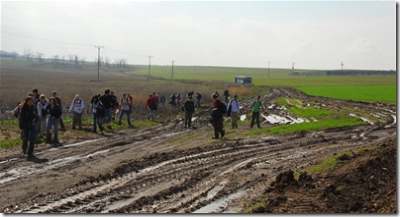I’ve been busy, with several days of “excavating” in the City of David and then several days up north on a “get-away” with Kelli. Now I have a stack of midterms to grade. But here’s something for you the next time you’re sitting next to someone on an airplane who is annoying you. Just turn on your computer, go to this site, and with your head turned upward, close your eyes.
Todd's Tips for Dating
I looked tonight and saw that I haven’t posted anything here in a week. Sorry to disappoint. I guess nothing has come to mind at the right time. But I looked through my stack of “drafts” and found something that, while unpolished, might get me out of having to think harder.
Yesterday was, of course, Valentine’s Day. To celebrate, I took the students to Shiloh where we did a careful biblical exegesis of Judges 21, which gives the prescribed method for dating. This chapter is really quite helpful and relevant. After the study, it was time for application, and so the guys hid in the outlying area while the girls danced. In little time, quite a few matches were made and the biblical principles were ingrained in ways that can hardly be surpassed.
More seriously, at some point in the recent past, I jotted down a few thoughts I had with regard to dating. These are primarily geared to ladies. I find that ladies need to hear this more because 1) there tend to be more ladies than guys in Christian circles, including TMC; 2) ladies generally are not pursuing guys and thus have less “control”; 3) society, especially Christian society, has placed some unbiblical expectations on young women with regard to marriage. So, for what it’s worth, here are a few of my thoughts.
- Don’t be consumed; don’t be anxious.
- Be happy to be single; take advantage of the opportunities you wouldn’t have if you were married.
- Don’t come on too strong; I’d probably avoid this line: “I’m hoping to get married in a year and a half.”
- But don’t act uninterested if you might be.
- Don’t be unsatisfied with a good friendship; the best marriages come from this.
- Wait for the right guy; that means passing some by.
- Be the right girl.
- If you dress immodestly, you’ll get a guy (the wrong one).
- They can tell the difference between genuine and a show.
- Compromise on some things but not on his faith.
- Consider whether you should move to a place where there are more of the right kinds of guys.
Some potential titles for my new book:
- Dating: What You Can Learn from the Benjaminites
- Grab a Girl and Go
- Valentine’s Day, God’s Way
- The Vineyards of Shiloh: A Biblical Strategy for a Happy Marriage
- I Kissed Courting Goodbye
Memories in the Mud
I think this picture might be worth a thousand words and that you can figure out the story yourself.
You would be on the right track if your story includes the following elements: courageous bus driver, old bus, steep road bus couldn’t quite make it up, alternate back road that looked really promising, strong young men who pushed the bus out of foot-deep mud time and again, big mudhole that ultimately dashed our dreams.
The students understand in a new way why kings went out to war after the rainy season.
Blank Space
The latest issue of the Journal of Evangelical Theological Society arrived in the mail today. Near the back is my first published book review. Yes, I know. I’ve been a teacher for how long and I’m not announcing my first book. All these years and one measly little book review about a book that’s not really a book in a journal of a small fringe group of religious scholars. I’m a loser; thanks for the reminder.
Actually, it’s not the first book review I’ve written. No, about 10 years ago I wrote another book review. It was rejected. From an even lesser journal with a readership of 13 people or so. They said it was too negative. (Or maybe they used words like “cruel,” “brutal,” or “crushing;” I can’t remember.)
So I’m on my way. In another ten years, maybe I’ll have another book review accepted.
On the other hand, no student has ever asked me how many book reviews I’ve written. None has ever complained on a course evaluation that I don’t write enough journal articles. But when it comes time to writing a resume, filling out a professional form, or applying for further studies, there’s lots of blank space.
(If you want more than self-reflecting drivel, see the other post I wrote today.)
Guy Needed for Ministry Position in Jerusalem
A Christian organization that I have connections with is looking for two guys who can serve as videocamera operators in Israel from June-Nov 2007. Preferably the guys have experience with videocamera work, though on-the-job training may be a possibility. The positions do not include a salary but are all-expense-paid, including airfare to/from the U.S. I’m not going to be more specific in this public forum, but I believe that the work of this organization is excellent. And I know there aren’t many opportunities like this. If you think you might be interested, email me and I’ll forward your email on.
Why the Bible is "Bad History"
I read an interview today with James Crossley, an NT scholar at the U. of Sheffield. He was named the “Blogger of the Month” for January, which means that someone thinks he’s important. I just wanted to point out two paragraphs near the end:
There are plenty of evangelicals doing excellent stuff and in certain cases you ‘d never guess they were evangelicals. Then some do the kind of history that can only be described as the equivalent of Intelligent Design. God directly intervened in history, made Christianity happen, bodily raised Jesus from the dead etc. etc. These are the kinds of explanations professional historians wouldn’t touch, just as professional scientists, at least so it seems to me, wouldn’t touch Intelligent Design.
Relating this to your question (sort of), there is something problematic going on when certain scholars can talk of doing good history, accuse opponents of doing bad history, and then tell us that someone’s mother was a virgin, people really did bodily rise from the dead, and that God’s hand is working in history. If you believe those latter points and want to argue for them, fine. But it isn’t what historians would call good history so perhaps it is time, at the very least, to acknowledge that the rhetoric is inconsistent. I can’t imagine too many professionals working in history departments coming up with arguments in favour of the miraculous or the divine hand in history.
In other words, if you believe that there is a God who works in this world (i.e., supernatural), then you are, by definition, not a historian. History, by definition, excludes the possibility of the supernatural. This idea is anything but new, but I thought it worthy of noting given its clear and recent expression.
If you want to win the debate, simply define your terms so that your opponent is automatically disqualified.
Blind from Birth
I love to teach on the field and I love to come home.
I just finished a series of Jerusalem trips which were somewhat more challenging than others because of my health, the large group size, the weather and a few other factors.
But I really love to teach and it really is easier when you have a good group.
I was struck anew today at our last stop at the Pool of Siloam by what Jesus said to the disciples.
As he went along, he saw a man blind from birth. His disciples asked him, “Rabbi, who sinned, this man or his parents, that he was born blind?” “Neither this man nor his parents sinned,” said Jesus, “but this happened so that the work of God might be displayed in his life.
According to the way I understand it, Jesus was saying that this man was blind since birth just so Jesus could heal him and God would be glorified. That is mind-blowing, especially if you believe that God exists to serve man.
Perhaps there is some application to your life. Maybe you’ve always been able to see, but perhaps there is something else that God caused/allowed so that he would be glorified. Maybe someone hurt you, or you have some physical limitation, or there’s some other inexplicable trial. I wonder if maybe that wasn’t an accident, that maybe God wasn’t asleep that day, that maybe God had a deep and mysterious plan that you may not learn about until you’re really old or dead. But perhaps God knew that he would receive greater glory from/in/through you because of it.
Two thousand years later, we’re still telling the story of God’s marvelous grace on a man born blind. What the world would have lost if he hadn’t suffered all those years.

Pool of Siloam
You're Ugly
Responding to Another View on Ezekiel
My friend P.J. Tibayan has excerpted a section from D. A. Carson in a comment on the previous post. My intent in posting the previous bit about Ezekiel’s temple was to save myself time because I am short; I’m not sure that I succeeded. But I want to respond to Carson’s comments, and it is easier to do in a regular post than in a comment. Here it is in full, and then I’ll respond piece by piece:
The mid – twentieth – century form of dispensationalism argued for a similar literalism, but held that the construction of the temple and the return of blood sacrifices and Levitical and Zadokite priesthood will take place in the millennium. The sacrifices would look back to the sacrifice of Christ in the same way that the Old Testament sacrifices looked forward. But it is very difficult to square this view with the theology of Hebrews. Moreover, there are many hints that these chapters should not be taken literally. The division of land (chaps. 47 — 48) is all but impossible for anyone who has seen the terrain. The impossible source and course of the river (47:1 – 12) strains credulity — and in any case both the temple and the river of life are given quite different interpretations in Revelation, the last book of the Bible. With the best will in the world it is difficult to see how the prescribed tribal purity of Levitical and Zadokite lines could be restored. Intervening records have been lost, so that no one could prove his descent from Aaron. Presumably a dispensationalist could argue that God could reveal the necessary information. But the point is that the tribes have been so mixed up across the centuries that they cannot be unscrambled. The problem is not one of information, but of mixed lines. Thus this interpretation, precisely because it deals with something at the end of time when the tribal lines are no longer differentiable, is even less credible than the previous one. How, then, shall we interpret these chapters?
The mid – twentieth – century form of dispensationalism argued for a similar literalism
He starts off with a backhand swipe, trying to suggest that this type of interpretation is so esoteric that it was only held in the mid-twentieth century. In fact, it has been held much earlier than that and is still probably the primary view of evanglical Christians today. Regardless, there are many highly respected scholars who hold to it (including past presidents of ETS).
but held that the construction of the temple and the return of blood sacrifices and Levitical and Zadokite priesthood will take place in the millennium. The sacrifices would look back to the sacrifice of Christ in the same way that the Old Testament sacrifices looked forward. But it is very difficult to square this view with the theology of Hebrews.
Maybe difficult, but by no means impossible. Why is it not possible to have sacrifices that remember Christ’s death. That there could be such a need during the millennium is suggested by the fact that at this time there will be fewer deaths (because of a partial lifting of the curse; cf. Isa 65:20). Gleason Archer offers an appropriate warning in this regard:
We in this age are hardly more competent to judge concerning the new requirements and conditions of the future millennial kingdom than were Old Testament believers competent to judge concerning the new forms and conditions which were to be ushered in in the New Testament age after Christ’s advent (1994: 418).
Moreover, there are many hints that these chapters should not be taken literally.
Maybe there are “many,” but he gives only three, and none of them are related to the temple. One of these is not a “hint” suggesting that it should not be taken literally. It’s Carson’s suggestion that things have changed so much since Ezekiel that it’s no longer possible for Ezekiel’s prophecy to be fulfilled.
The division of land (chaps. 47 — 48) is all but impossible for anyone who has seen the terrain.
I’ve seen the terrain and it is not impossible. I know secular Israelis who have drawn up maps of Ezekiel’s redistribution of the land. They may not believe it will one day happen, but it’s not impossible. Certainly, one should realize that there may well be geographical changes before this time. For instance, Zechariah predicts that the Mount of Olives will split in two with a great valley running through it (14:4). So some things that don’t fit now could well fit then. (Aside: how do you interpret the Zech 14 prediction? Is that a future literal event? How do you know? Once you start to decide on your own what is possible and what is not, you can easily start changing major, important theological passages, including ones that describe Christ’s return.)
The impossible source and course of the river (47:1 – 12) strains credulity
It is impossible that the land could be so altered so that there’s a spring at the Temple Mount? If God can’t do that, then for sure he can’t part the Red Sea or raise the dead. Yes, descriptions that say that the Dead Sea will become fresh water are mind-blowing, but that’s the point. And Ezekiel’s little note about fisherman spreading their nets at En Gedi does everything to suggest that he means this literally. You can imagine the “spiritual meaning” of the Dead Sea becoming fresh (God gives new life to his people), but as soon as you got a line and a hook at a specific geographical locale, the “spiritual meaning” doesn’t hold. Now maybe Ezekiel is wrong, but I don’t know how you take him to mean something else.
Aside: here’s a prophecy that is more mind-blowing: Zech 12:10; cf Rom 11:26. If “mind-blowing” means it is therefore impossible and unliteral, then we’re fools to believe in the resurrection of the body. I mean, after a few years, our dust gets scattered to quite a few places.
— and in any case both the temple and the river of life are given quite different interpretations in Revelation, the last book of the Bible.
One problem with those who don’t take prophecy seriously is that they don’t study it carefully. Ezekiel and Revelation are describing different things at different times. (That is readily obvious from the Dead Sea in Ezekiel 47 and the “no sea” in Rev 21. Revelation of course distinguishes about the millennium and the eternal state as separate periods of time.)
With the best will in the world it is difficult to see how the prescribed tribal purity of Levitical and Zadokite lines could be restored. Intervening records have been lost, so that no one could prove his descent from Aaron. Presumably a dispensationalist could argue that God could reveal the necessary information.
Does Carson disagree with this? Could God? If so, then this is not an issue.
But the point is that the tribes have been so mixed up across the centuries that they cannot be unscrambled. The problem is not one of information, but of mixed lines. Thus this interpretation, precisely because it deals with something at the end of time when the tribal lines are no longer differentiable, is even less credible than the previous one.
I wonder how Carson knows this. Does he know that many Jews do know what tribe they belong to? Does he know that twice a year I stand at the Western Wall while Levites press by to get to the front to do the priestly blessing? Does he know my friend who is of the tribe of Benjamin? Now if the question is one of “proving” by means of legal docu
ments to stand up in a court of law, then the matter will fail because of things like the Holocaust (in which case Satan succeeded; he didn’t have to wipe out the Jews, just their records). Concerning whether the tribal lines are scrambled, how many dads does a person have? You have only one. Whatever tribe your father is in, you are too. You can marry sixteen times, you can adopt, you can do whatever, but every kid has one father and thus one tribal identity. Maybe everyone doesn’t know it, but if God knows every hair on the head, then I’m guessing he’s not at a loss for who belongs to which tribe. Of course, this issue is important in several places in Revelation.
There’s a lot of people who deny the literal fulfillment of many biblical prophecies. I hope they have better reasons than Carson.



